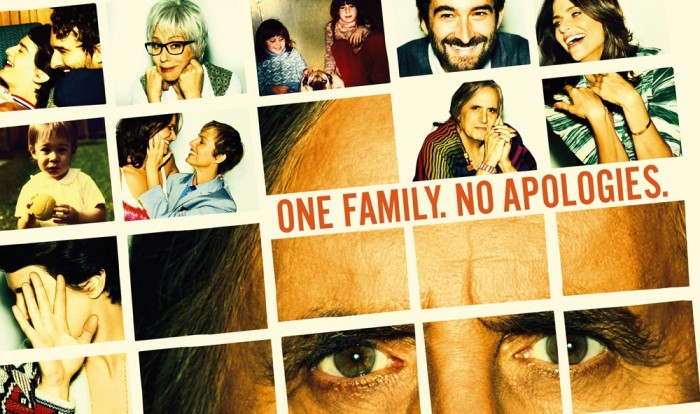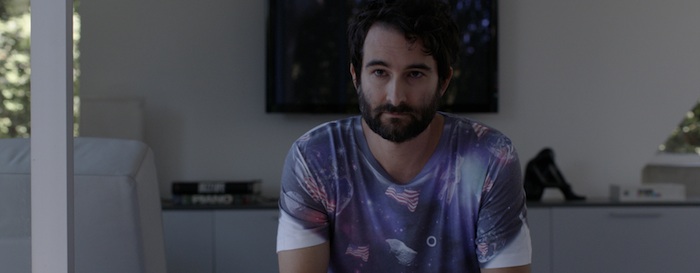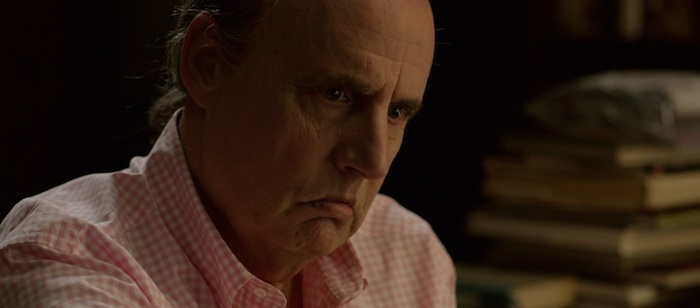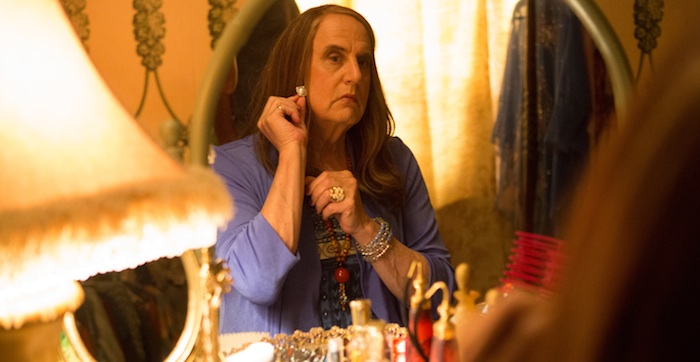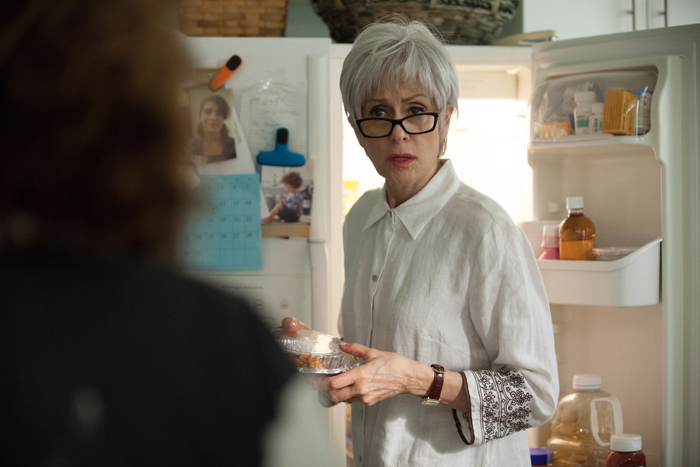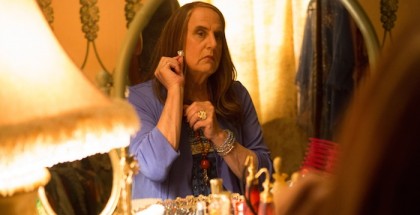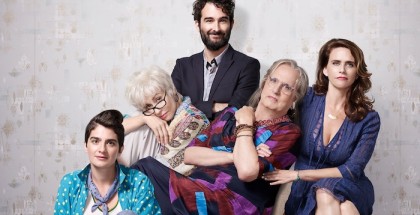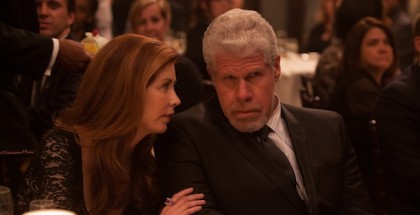Interview: Jill Soloway, Jeffrey Tambor and Joe Lewis talk Amazon’s Transparent
Andrew Jones | On 26, Sep 2014
Amazon’s new binge-watchable show Transparent, about a man who identifies as a woman and his narcissistic children whom he cannot find a natural way to come out to, is released today. (Read our five-star review.) The 10-episode series, created by Jill Soloway (Afternoon Delight, Six Feet Under), stars Jeffrey Tambor as Maura Pfefferman.
We sat down with them both, along with Amazon Studio’s Head of Comedy, Joe Lewis, to discuss the series. But first, as is the duty of any fan, we gave Pop-Pop a Grisham.
“I like John Grisham, and I happen to be at the end of my novel. This is perfect. Thank you so much!” Tambor offered his gratitude, before we revealed a message inside for him: For not touching the Cornballer¡, Pop-Pop gets a Grisham. From your friends at VODZilla.co – because being an Arrested Development fan means dropping in as many references in one moment as you can.
Before any question is asked, the three begin to natter on the sofa together, a mix of jet-lag and a long junket day has them quoting the show. “Eww to the Holocaust!” (one of its best lines) is repeated, as Jeffrey thinks about the show’s casting.
“That’s a hallmark of our show,” he says. “Everywhere you look, the casting is impeccable. What I mean by that is that no-one but Alison Sudol could have played [the girlfriend of Jay Duplass’ record producer, Josh Pfefferman], with that haircut, those lips/… She’s gorgeous. And she’s wonderful, and very, very interesting.”
This takes us to Jeffrey’s joining of the pilot, one of Amazon’s second run. “I threw myself at this project. They sent it to me, my wonderful agents, and within 15 minutes I demanded to be in the show. It’s a no-brainer on my part; it’s the part of a lifetime and the show of a lifetime.”
“There was only one person for each of these roles,” Jill throws in. “Jeffrey was always Maura, and Gabby [Hoffman] was always Ali, Judith [Light] was Mom. I met Jay [Duplass] at a party when I was really bereft about trying to find the right Josh and I was like ‘That guy, that’s what Josh looks like!’ I went up to him and asked ‘Are you an actor?’ ‘No,’ he said, ‘I’m a director.’ We talked and 15 minutes later, I got him to agree to come in and audition the next day.”
“The secret is work with people you love…”
Jeffrey agrees that Jay is a wonderful actor. “I was watching him last night and his presence is so loving and he is, to me, I call him Joshie. He’s Joshie. His performance is so unembellished and so heart-driven. When he sings that song with his sister, Operator, oh my goodness. I don’t know Mark [Duplass] but we are so lucky to have Jay.”
We go back to Tambor and his long-standing career of playing people who, despite their positions in life, are full of heart.
“I think that’s on the W2 for me. You either fall in love or you don’t do it. I happened to play Joseph in The Mystery Plays once, father of Jesus. I wasn’t good.”
Why not?
“The Mystery Plays are written in the 15th century, that’s one! And second of all I kept getting, when baby Jesus came out, I kept getting laughs. I was trying not to. I wasn’t good. That was at the Milwaukee Repertory Theater – I’m sorry, Milwaukee. The director said ‘You’re doing a take’ and I said ‘I’m not doing anything!'”
“I like doing this,” he says of TV. “I love the life between action and cut. The rest I’m a rank amateur. Really, I can’t repair things. I love to read and I like to act. There it is. It makes a lot of sense to me. The secret is work with people you love and who get you and the two people who are sitting on this couch, Joe Lewis and…”
“Pfeffernüsse,” Jill exclaims, as Jeffrey forgets her name.
“Pfeffernüsse,” he echoes. “Jill Pfeffernüsse is one of my favourite people.”
We look to Jill to discuss the show’s origins. Did she always plan to tell the story episodically?
“I was writing for it to be either. I didn’t set out for it to be a television show, I just set out for it to be my story. These people were real and I had to tell their story. I could just see it all, the scenes where Ali and Sarah are cracking up and laughing, trying to figure out what this all meant. The family has always been real to me. They’ve just honestly told me what they wanted to say and all I’ve done is write it down and get these actors to channel it, which is easy. I didn’t feel like I found, and I certainly didn’t feel like I came up with, this idea. I feel like I got a tap on the shoulder from the universe saying ‘This is your thing, now go’.”
The show isn’t a one-woman show. There are multiple writers, even though it feels consistent and with one voice throughout. How was that achieved?
“I told the writers that I see the Pfeffermans as these five souls out in the universe, hanging about by the stars, waiting and looking for someone to pay attention so that they can tell the world what they want to say. It sounds super magical and silly but I think of them, I feel their voices are lightning looking to ground and it’s the writer’s job to get themselves in a space where they can hear what the Pfeffermans have to say.”
She learned that from Six Feet Under, she reveals.
“I learned that from Alan Ball. He had a very singular voice on Six Feet Under, but all of us, we were finding that voice together, we were tuning in to that Fisher voice and we were writing Alan’s story. Alan had a very particular story in that he lost his sister in a car accident when he was a little boy and he was always destined to tell a story about a family who were magnetised around death. I always knew this family would be magnetised around things like love, identity, gender, sex, secrets, food. This was my story to tell, even before my parent came out, I could feel this family and one of these days I would get to tell their story. It just happened.”
The show still had deadlines, though. We ask Jill how they could do so much without feeling rushed and what kind of schedule they had.
“We had a few months and I tried to do the same thing with the writers as we did with the actors, which is come to work with a sense of fun, connect over a feeling of gratitude. That old Steve Martin record “I Get Paid For Doing This”? We sit in the writer’s room with the feeling that we get to sit here and do this. That’s the first point of connection – gratitude, and joy and laughter.”
Laughter was key, she continues. “The writer’s room is the funniest place in the world! All you do is crack up and say the stupidest things you can think of and, somehow, you start to talk about your life and somewhere in there are real stories and real moments. The moments go up on the board and the season begins to take shape. Each writer had their own episode, some writers had two, and I chose the writers for the ways in which they felt familiar to me, but not identical.”
“We’re not going to win by doing what everybody else is doing, so we think about it differently.”
The actual order of events was very fluid, with things getting moved from episode to episode.
“Sometimes you’ll see a scene in Episode 5 which was originally in Episode 8, so somebody else wrote it. I feel that everyone’s voices are in every episode, and it really was a group process.”
Turning to Joe, who at that point was more than happy to just relax with these folk on what seemed like a comfy, if sunken, couch. Taking on a show that is different – a 30-minute drama with humour – as well as telling a story that hadn’t really been dealt with on TV before, was a risk, wasn’t it?
“The way to break out is to not run into the scrum, you look at what’s being done out there exceptionally well within the world of what can be done exceptionally well and I didn’t see anything like this. For us, the real difference is not the comedy drama, it’s looking at it as a five-hour movie with nine intermissions and telling it as one continuous story.”
It’s a phrase was repeated at the premiere of the show earlier in the week too – one that he sees as a natural evolution for content in the video on-demand age.
“As the platform changes, the product changes as well,” he argues. “The product is a TV show, the platform is completely different to radio, broadcast, cable television. The platform called for something like this and I think when you’re telling a five-hour story you have to represent life in some way and life is funny. It attracted us to Jill to begin with – her movie [Afternoon Delight] was hilarious and sad. It’s so hard to have something that is hilarious and sad, and funny and authentic.”
“And dirty and sexy,” Jill adds.
“I just think it captures that, as Heidegger said, dread precedes authenticity,” Joe concludes, tying together the series with Amazon’s own approach to commissing content. “Life is full of fear and getting over that fear. It’s a way of avoiding everything else that’s out there. We’re not going to win by doing what everybody else is doing, so we think about it differently.”
During the interview, reviews begin to go live online, some calling Transparent the best show of the new season. After a hearty round of high-fives on the sofa, Jill takes point.
“I think Joe and I dreamed that we could do this, and laughed along the way. My agent Larry, when I was trying to figure out where to make it, said – at that time Alpha House hadn’t even started – ‘What’s Amazon streaming?’ He said: ‘If you hit this, you could be their Mad Men to AMC, their House Of Cards to Netflix!’ and I said: ‘Yeah, ok, I’m going to step up to the plate. Give me the ball, let me try.’ And we f**king hit it.”
“It is a risk to do a show like this,” Joe admits. “It was a huge risk for Jill to do this with us. Jeffrey could do anything in the world. It was the perfect storm of people taking risks at the same time.”
He finally finishes his well-deserved high-fives.
“I don’t really see a difference between TV and movies anymore.”
This year has seen the rise of what might be termed ‘auteur television’ – we’ve had both True Detective (one writer, one director) and Fargo (one writer for the entire season). Transparent is similar, as Jill’s voice and eye is over every aspect. Is TV changing its reception of the artist?
“I don’t really see a difference between television and movies anymore,” she admits.
“When I was at Sundance and I went through an international tour with my movie, people kept asking me what the difference is between TV and movies and honestly, it’s exactly the same.
“I came from Sundance and I brought with me my cinematographer, my make-up artist, my editor, my production designer. All of the same people who worked on my movie worked on this TV show, and when we were a bunch of directors hanging around at Sundance after the movies had screened, we were a bunch of people wondering where we were going to get distribution. People weren’t going to be going into theatres and watching our movies together. That only happens with movies that are in 3D or about superheroes or car crashes or about international violence. Movies about people, human stories, they simply aren’t told on the big screen anymore. You can find them, but they are very rare and that whole ethos, the ethos of the independent filmmaker of the late 60s, 70s, Scorsese, Cassevetes, Altman, people who were making these films about what it means to be alive, Woody Allen? Thank god for streaming television and thank god for the cult of the auteur because it’s given people a place to go.”
Jeffrey chimes in: “In my field they would always say, in Broadway, they’d say ‘Oh, we’re going to get you a movie out of this’ and we used to laugh and that whole thing of the movie legitimising the actor is no longer the mode. Now, the writing, the best writing, is right here. Everyone is moving here, because you can tell your story untrampled and you can tell the truth. You can have a singular view and it’s not modeled by opinion.”
“It’s a very interesting time to be a young actor,” he confesses. “I wish this had been going now when I was a young actor because now there’s a lot of opportunity and a lot of real good content.”
Joe nods. “And now you get to see it forever, and that’s the dream of 60s and 70s movies, that’s the correct dream, it’s just the distribution system wasn’t enough to support the dream financially. If you wanted to see a movie in that six weeks that the movie was out, if it wasn’t playing in your town or within driving distance, you wouldn’t see that movie. Now, you can watch it anytime, anywhere.
“That’s the dream, and I don’t like to put words into Jill’s mouth, but the filmmaker, you can watch the things in the best resolution possible whenever you want to watch it and it’s their obligation to make something that makes you, as Jill says, put down your cell phone and put down your laundry, I think that the financial model of Video on Demand can support the creative model of auteur storytelling.”
Jill notes how much the system has changed in just a few years. “Even five years ago, 10 years ago, we’d have had to raise money for and make an indie film, or do this in grad school, as part of a museum show documenting the lives of others. It’s such personal work that inspires us to make art, make art, make art. I think it feels like Amazon is saying: ‘Go, make your thing.'”
So would Transparent have even been feasible 10 years ago?
Joe responds: “It used to be on average people used to watch every third episode of a television series. I don’t think you could have told this sort of depth of character and story watching every third episode. I don’t think you could have made this show 10 years ago.”
“You know what I’d like to say about this show?” adds Jill. “I’m going to do something fun, but is very true. The show is meant to be experienced like this.”
She grabs two sofa cushions, wrapping her arms around one, and legs around the other, laying down, face mushed in the cushions.
“This is how you’re supposed to experience this show. All of it.”
“Good luck writing that, by the way,” Jeffrey adds.
Jill continues: “You talk to your family, then you go in the other room and watch this show and you can love it. You can watch 10 episodes and then you can watch them all over again. And you can’t do that in a theatre and you can’t do that when you’re waiting until next week. You can’t do that when it’s a show made with a laugh track. It was made for people to just cuddle up to and dive deep in and fall in love with. Get cosy with, it’s so intimate.”
“It was made for people to just cuddle up to and fall in love with.”
“I think people who watch this more than once, there’s so much to find, something new each time,” Joe suggests.
Jeffrey nods. “I did that last night, I was seeing things last night that were absolutely brilliant.”
“I can’t recommend enough watching more than once, we’ve seen this 10 times and I still catch looks, the other day there’s a hand movement Jeffrey makes in the final episode that makes me laugh – when he tries Coleslaw. It’s the funniest hand movement and you might miss it the first time and it’ll make you laugh so hard.” Joe says, nailing the ‘watch this show’ line hard.
The end result is a very intimate, honest and emotional piece of art – brutally so, at points. In keeping with that, the actors bare more than their souls for the camera. We approach the subject of nudity and sexuality as part of bringing the audience and the characters closer.
“I don’t really think about that much,” says Jill. “I am just receptive when it comes to the characters in the script. I teach my writers to be the same, so I’m looking like a court stenographer. Fall asleep, waking up, driving, in the shower, hearing lines, hearing moments, seeing scenes, getting to my computer and writing them down.”
The subject of laughter comes up again.
“When I’m at work, I operate a technique I learned from a woman named Joan Scheckel. She has an organisation called the Filmmaking Labs in Los Angeles, where she’s teaching a simple acting tecnhique which is called ‘playable action’. What are we doing to get what we want? I’m trying to create the space on the set for the actors to go to their risk spaces and take chances with their bodies, with their performance, with their souls, and, honestly, what I’m doing at any given moment is try to make him laugh…” Jill gestures her head to Jeffrey.
“I’m trying to crack up Kathryn Hahn, trying to break up Jay Duplass, trying to surprise myself and surprise them. Trying not to laugh when we’re recording and they’re cracking me up. We’re really in the business of Play with a capital ‘P’. If you think about the word ‘play’ and that theatre is ‘a play’, so much is taken away from the process of creating story. All I’m doing is bringing the Play back to play.
“I’m bringing play back to The Play,” she repeats. “That’s going to go onto my headstone.”
Jeffrey, who for a moment has been silently contemplating the words, brings the room in:
“This whole thing, this notion about humour and pathos, all of that, I was just recalling, I keep talking about the great authors and Jill being in that lineage, but I just remembered my dad when he was failing, we took him back from the hospital – he had lost so much weight and he got out of the car at Walnut Creek and his pants fell off. In one of the saddest moments of our life, we were pounding the car, pounding it, laughing, both he and I. And he had two months to live. Those who know that are the seers, and those who modify that are just the manufacturers and are to be shunned. I am so moved, I have to go to my room. And I think audiences know that, they go ‘Oh, they’re talking like my life is, I will pay attention…’ or ‘I’m being scammed and I’ll pay attention. but I’m not going to pay attention with the same attention units.'”
“It was the perfect storm of people taking risks at the same time.”
Jeffrey looks at our gift. “Is this the guy who wrote The Lincoln Lawyer?”
“No, that was Michael Connelly,” Joe replies, before a lightbulb clicks on, “and you can see Bosch by Michael Connelly this fall and next year on Amazon! Also Alpha House, Mozart In The Jungle.”
“Also bags for your vacuum cleaner, £12.99, order six and subscribe for the next year,” replies Jill.
“I bought these in black on Amazon,” Jeffrey points to his shoes, which are brown versions of what we assume he ordered. “I like that whole thing, I like going like that (Jeffrey immitates browsing and clicking) and it’s there.”
“Sometimes on a f**king Sunday!” Jill giddily joins in. “I’ve ordered my son a LEGO and it arrived that evening, on a Sunday.”
“Only in the US,” Joe clarifies.
We ask what streaming services they use – and what the last thing they streamed was – and, sure enough, they know how to play the game and secure that second season.
“Amazon Instant Video only,” Jill says immediately.
“Ditto,” Jeffrey adds.
As the interview closes with more joking, it’s clear that Jeffrey, Jill and Joe are very happy with the show they have created. With good reason.
“The most important TV show of the year” – read our Transparent review.
Transparent is available exclusively on Amazon Prime Video from today, as part of a £5.99 monthly subscription.


